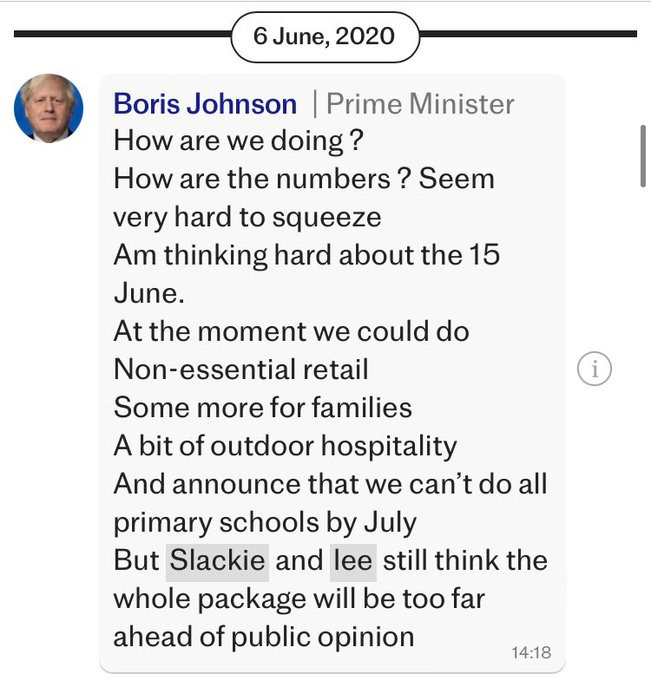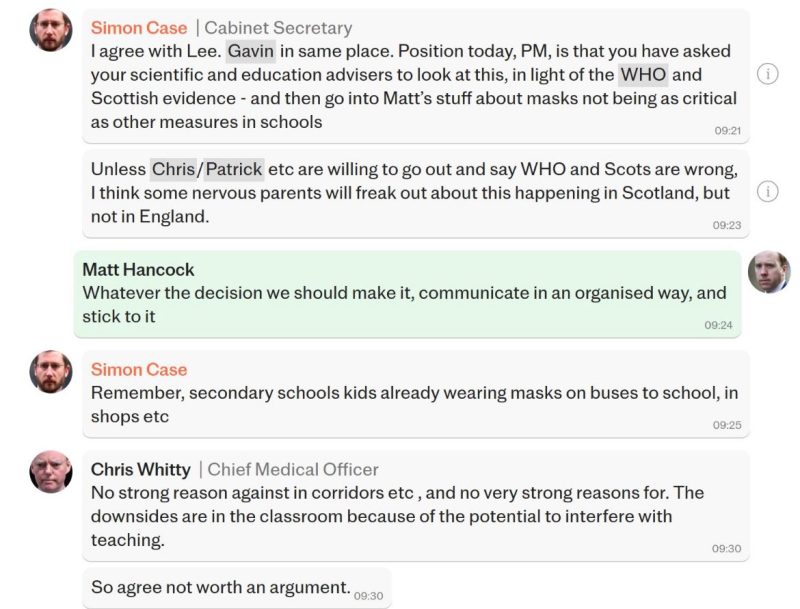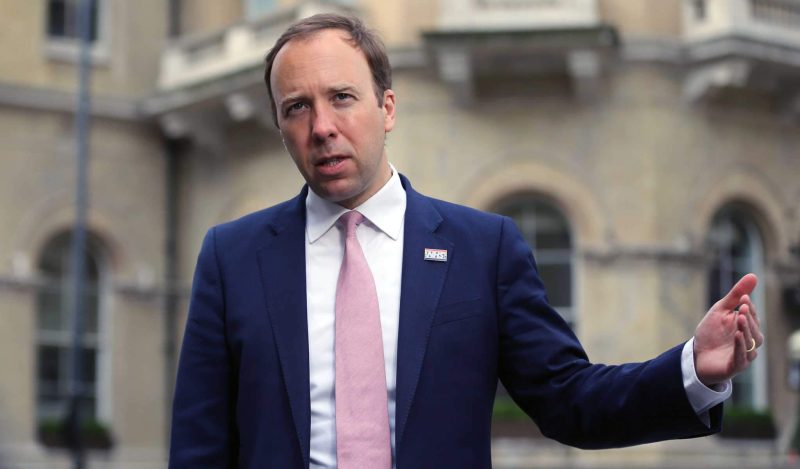Leaked messages from December 13, 2020, show former UK Health Secretary Matt Hancock planning to “deploy the new variant” in Covid messaging to “frighten the pants out of everyone” in order to “get proper behaviour change” in the British public’s compliance with lockdown measures.
JUST IN: New leaked messages show UK Health Minister Matt Hancock planning to “deploy the new variant” in COVID messaging to “frighten the pants out of everyone” in order to “get proper behavior change” in the public’s compliance with lockdown measures. pic.twitter.com/czU9AZS18z
— Michael P Senger (@MichaelPSenger) March 4, 2023
The new leak is the most damning revelation to come so far from the Daily Telegraph’s recently-announced ‘Lockdown Files,’ which are based on an archive of over 100,000 messages sent between Hancock and other officials. Journalist Isabel Oakeshott ostensibly obtained the WhatsApp messages to assist with a book about Hancock, comprising the biggest leak of UK Government data in over a decade and shedding new light on the UK’s lockdowns, mandates, and fear messaging.
As the Telegraph summarized:
The Lockdown Files – more than 100,000 WhatsApp messages sent between ministers, officials and others – show how the Government used scare tactics to force compliance and push through lockdowns.
In another message Simon Case, the Cabinet Secretary, said that “the fear/guilt factor” was “vital” in “ramping up the messaging” during the third national lockdown in Jan 2021.
The previous month, Hancock, the then health secretary, appeared to suggest in one message that a new strain of Covid that had recently emerged would be helpful in preparing the ground for the looming lockdown, by scaring people into compliance.
In a WhatsApp conversation on Dec 13, obtained by the Telegraph, Damon Poole – one of Mr Hancock’s media advisers – informed his boss that Tory MPs were “furious already about the prospect” of stricter Covid measures and suggested “we can roll pitch with the new strain.”
The comment suggested that they believed the strain could be helpful in preparing the ground for a future lockdown and tougher restrictions in the run-up to Christmas 2020.
Mr Hancock then replied: “We frighten the pants off everyone with the new strain.”
Mr Poole agreed, saying: “Yep that’s what will get proper bahviour [sic] change.”
Psychologists have already warned that some Government messaging during Covid, including using alleged “fear tactics” in poster and health campaigns, were “grossly unethical” and that inflated fear levels contributed to excess non-Covid deaths and increased anxiety disorders…
Four months later, in Oct 2020, Mr Poole suggested in a group chat that a decision to stop publishing a so-called watchlist of the areas with the highest prevalence of the virus would be helpful to the Government, because it would make every area of the country concerned about the spread of Covid in a second wave.
“It helps the narrative that things are really bad if we don’t publish,” messaged Mr Poole.
In a second article on the new revelation, the Telegraph went on:
Throughout the course of the pandemic, officials and ministers wrestled with how to ensure the public complied with ever-changing lockdown restrictions. One weapon in their arsenal was fear.
“We frighten the pants off everyone,” Matt Hancock suggested during one WhatsApp message with his media adviser.
The then health secretary was not alone in his desire to scare the public into compliance. The WhatsApp messages seen by the Telegraph show how several members of Mr Hancock’s team engaged in a kind of “Project Fear,” in which they spoke of how to utilise “fear and guilt” to make people obey lockdown.
An Imperial College London survey of Covid infections in the community – called the React programme and led by the eminent professor Lord Darzi – provided “positive” news for Mr Hancock and his team… But when the media focused on a separate report by Public Health England and Cambridge University showing a high transmission rate in some parts of the country – prompting speculation that local lockdowns could follow – Mr Hancock said: “That’s no bad thing.” Sir Patrick Vallance, the Government’s Chief Scientific Adviser, agreed.
With recorded Covid cases now down to just 689, the Government was days away from reopening pubs, restaurants and hairdressing salons.
But on June 30 2020, Leicester had just gone into a local lockdown. In a WhatsApp group called “Local Action Committee,” Emma Dean, Mr Hancock’s special adviser on policy, reported back to the group a rumour that Milton Keynes may be the next town plunged into a local lockdown.
Jamie Njoku-Goodwin, Mr Hancock’s media adviser, replied that it would not be “unhelpful” for the public to think they could be next.
They agreed that minor adjustments, such as banning angling, would be “parodied galore” – so decided that “fear” and/or “guilt” were vital tools in ensuring compliance.
They discussed making mask-wearing mandatory in “all settings” because it had a “very visible impact.”
Along with Hancock’s terror campaign are several other eye-opening revelations. In one conversation, then-PM Boris Johnson declined to lift lockdown restrictions after being told that reopening was “too far ahead of public opinion.”

Johnson later expressed regret about his decision to implement a second lockdown after being informed that the decision had been based on “very wrong” mortality data.
In another incident, a mask mandate was imposed on British schoolchildren for the first time after Chief Medical Officer Chris Whitty reasoned that the issue was “not worth an argument” with First Minister of Scotland and strict lockdown advocate Nicola Sturgeon.

By any measure, the Telegraph’s Lockdown Files provide invaluable and astonishing new insight into the depths to which the British Government and its counterparts all over the world sunk as they weighed the perceptions of these unprecedented, unscientific, futile measures against the opinion of the increasingly-terrified and ravenous segment of the public that kept demanding more of them, while devising ever-more-manipulative means of terrifying the more skeptical segment of the public into complying.
Still, critics of the Telegraph have valid reasons for skepticism. While the Telegraph has revealed astonishing evidence of what happened during Britain’s Covid response, after the initial lockdowns of spring 2020, it has yet to reveal any information as to why those initial lockdowns happened.
This is a conspicuous oversight, as the Telegraph itself, and most of its journalists, supported the initial lockdowns of spring 2020. Additionally, as a study by Cardiff University demonstrated, the primary factor by which most citizens judged the threat of Covid was their own government’s decision to impose strict lockdowns. The measures thus created a feedback loop in which the lockdowns themselves sowed the fear that made citizens believe their risk of dying from Covid was hundreds of times greater than it really was, in turn causing them to support more lockdowns, mandates, and restrictions.
For that reason, thoughtful commenters tend to believe that determining how the initial lockdown decision was made in spring 2020 remains the most important question of the entire Covid story. Everything else was downstream from the unprecedented terror sown by that initial decision. And, because widespread terror could be used as an excuse for all the decisions that came after, the activities that instigated the initial lockdown decision in spring 2020 may be the only ones in which criminal conduct is likely to be found.
Thus, insofar as the Telegraph fails to shed any light on the activities that led to the initial lockdowns in spring 2020, the value of the Lockdown Files in obtaining justice for the response to Covid will be severely limited.
That said, some of the Telegraph’s revelations of what happened—such as Hancock’s desire to “deploy the new variant” to “frighten the pants off the public”—are so damning that hopefully the public will begin taking seriously the question of why this all happened as well.
Republished from the author’s Substack
Published under a Creative Commons Attribution 4.0 International License
For reprints, please set the canonical link back to the original Brownstone Institute Article and Author.









